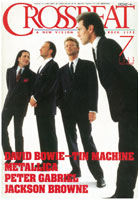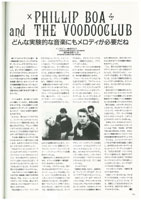Japanese monthly music magazine "CROSSBEAT" July 1989 (Vo.2 No.07)
 
(English translation)
PHILLIP BOA and THE VOODOOCLUB - "Any experimental music needs a melody"
INTERVIEW: TATSUKO TAKAMURA
INTERPRETER: HITOMI WATASE
Phillip Boa & The Voodooclub, which has moved from West Germany to the UK and has been highly evaluated, made the debut in Japan with the fourth album "Hair". Pop, experimental, melodious and even avant-garde, the unique sound seems to be based on the musical experience of Phillip Boa with a strong British influence while in a German band. We asked Boa, who is the main member, to talk about their roots and the policy of the band.
You are from Germany and active mainly in West Germany, but your lyrics are mainly in English. Is it because you can express your identity only in English? Or because you want to play on the world stage?
"Of course, we always have a desire to be an international band, not only in Germany. Just for that reason. At the time of our debut, we were more popular in the UK. and I think that English is the most universal language anywhere including in Japan."
But I don't think that you have become popular in the UK just because your songs are in English. Why do you think it was in the UK, not the US or Germany?
"I think it's because our first and second albums were distributed on a British label, and their sounds were very German. There are a lot of British bands in the UK right now.
I think our sound was fresh in that situation."
So you got a contract with Polydor. John Leckie was the producer of "COPPER-FIELD", which your first album after the transfer. The sound has become British and I felt it's not good enough.
"I liked the early Simple Minds and XTC, so we had only John Leckie as the producer.
He had all the power to decide on the album, and we tried to become to a British band completely. The result was not a very satisfying album. The previous two works were still better. They had the influence of classical music and they were experimental."
Are many of the artists who influenced you British?
"Not only them. In Germans, I was very influenced by Kurt Weill. Besides him, Can, NEU!, Stockhausen, Bach and so on. In British, I think I was very influenced by the bands in the 60's. The Beatles, Stones, early Pink Floyd, Led Zeppelin, etc.... I liked also the punk movement quite a bit."
The newest work is very various. Do you suppose that it's most strongly influenced by them?
"Well, this album reflects the 90's British music inside me. On the other hand, it reflects the roots of the German music inside me I mentioned earlier. It's kind of like my "manifest". It's the most perfect of the four albums. It's pop, but it's rock, experimental and classic."
You've had four big producers. Is it because you want to take in every style? Do you have any other intentions?
"I wanted to make a professional album with the help of people like Tony Visconti. He works on glam rock and straight pop-rock sounds. Tony Taverner is good at heavier things like Motörhead. About Nigel Walker, for example he works with David Sylvian, he has such a very esthetic part. I've used producers of all styles this way, so I think you can see different styles of music in one album. I'm very satisfied with it."
What is the concept?
"While composing experimentally, making the sound of "Philip Boa & The Voodoo Club" in the end."
The "Phillip Boa sound" is mainly composed of avant-garde rhythms and pop melodies. It seems to be a conscious departure from rock and roll. Is there an underlying anti-stance towards a typical rhythm?
"Yeah, we want to play weird and quirky avant-garde music. Not only that, I also think about the need for a good melody and pop. Any experimental music needs a good melody. Otherwise no one will like it, I think."
Besides band activities, you run an independent label called Constrictor. Is it because you felt a sense of crisis in the existing German music scene?
"I wanted to bring a new breath and energy.
They're all punk, noisy and energetic bands.
There are more bands that have British sound than Ata Tak and other regular German labels."
The title of the omnibus album released by Constrictor label in 1987 is "TEN YEARS AFTER THE GOLD RUSH". Is it a sign of the label's intention to exist, as the 10th anniversary of the outbreak of punk?
"that's right. Constrictor's bands have evolved through the music of 10 years ago, and there are only punk artists with the energy and power of the 90's. That's what "GOLD RUSH" means. Many of today's British bands have returned to their 60's / 70's roots and aren't doing anything new. American rock is more interesting."
What about German bands in general now?
"To be honest, they're boring. Everyone is trying to copy American bands, such as REM and Hüsker Dü. But I think it's a good basis. It will take another four or five years to grow."
|
 fanpage
fanpage 

 fanpage
fanpage 
